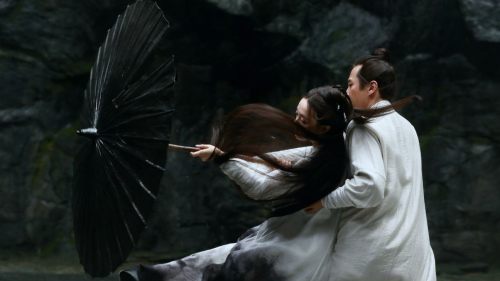TIFF 2018 Review: Zhang Yimou (Nearly) Returns To Form With SHADOW
Coming off The Great Wall, one of the most expensive Chinese productions of all time, one could be forgiven for thinking that Shadow would be a far more modest affair for Zhang Yimou. His latest film takes a decidedly different tack, aesthetically, switching from imagery of large, colour co-ordinated crowds to more sparsely populated frames shrouded in monochrome, strictly adhering to a colour code of contrasting whites, blacks and greys. Cinematographer Zhao Xiaoding creates peculiar, unique shots that recall traditional ink wash art; each scene feels as though the background were painted on with a brush. The visuals, and the film itself, are fixated around a point of duality - it doesn’t exactly hide it either, with a giant yin and yang painted on the floor of multiple scenes.
The film’s obsession with duality, as well as Zhang’s toying with his audience’s expectations, doesn’t end at its aesthetic - it’s quickly revealed that the revered commander is in reality a commoner named Jing, whose true purpose is as a ‘shadow’, a stand-in for the real commander, a warrior being slowly killed by a festering wound. Both the real commander and his ‘shadow’ are played by Deng Chao, in a dual performance of polar opposites - a raving, decrepit and vengeful man versus a quiet and obedient one. In addition to this double role there are opposing extremes everywhere, whether it’s in a duet on the lute acting like two opposing forces, the two faces of the commander, or the two kingdoms themselves.
As the commander trains Jing to take revenge on his behalf, there’s emphasis on the idea of ‘feminine’ fighting versus ‘masculine’ fighting, also presented as yin and yang. This duality presents itself in the film’s various power plays and secret schemes, each protagonist showing one face to one person, and another to everyone else. It perhaps overindulges in this aspect, so much so that it never takes the time to establish exactly why the conflict matters to these characters; only a couple are given clear things to fight for.
Further still, it doesn’t particularly motivate the audience to feel the same contempt for the enemy that these characters do, placing us in an awkward remove from these proceedings, beautifully as they are. It’s a bizarre set-up, punctuated by clunky exposition and completely fuzzy motivations for many of the characters involved. The film starts out fairly turgid in that regard, not having quite as much fun with the idea of the body double as it should - but that’s not to say it’s no fun at all; as Jing learning to fight with an umbrella makes for a unique spectacle.
But then the third act comes, a switch flips, and the film jolts to life as Zhang abandons all decorum, making a sharp turn from strenuous set-up to an inventive, unhinged bloodbath that not only features ancient scuba diving technology, but also an army of female criminals wielding bladed umbrellas. It’s an enthralling, inventive, rapturous descent into utter madness, so much so that the long and strange 60-minute preamble is ultimately made worth it, as there are few sights as great as this army of underdogs using their strange umbrella weapons to slide down a hill. There’s a Trojan horse plot, gallons of blood, and a surprisingly solid revenge subplot that may be the most satisfying narrative arc on the film. It only gets weirder from there, the film twisting itself into knots as various schemes and betrayals overlap in a cacophony of brutal violence. While Zhang’s pondering over duality doesn’t entirely crystallise into something affecting or poignant, the contrast between the martial arts early in the film as a bloodless, balletic act against the brutality of the last act might be the most effective study of this idea.
Shadow is split between two modes - cold, laborious set up, and wild, visceral action that communicates feeling better than any words from the film’s first half could. It’s a shame that the film can’t reconcile both of these tones, as it could have made for Zhang’s best project in years - but at the very least, it’s an incredibly watchable, raucous experiment.



